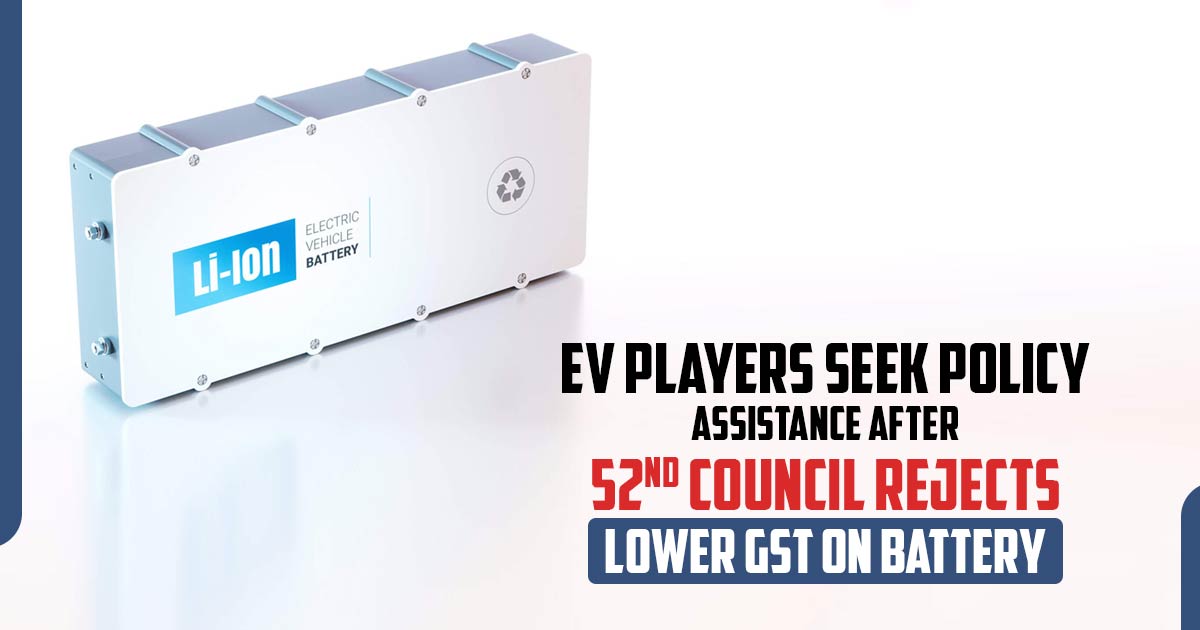
Although the GST Council has not mandated a tax reduction on lithium-ion batteries used in Electric Vehicles (EVs), many players in the industry remain optimistic about maintaining growth, though at a slower pace. They are actively seeking government support to expedite the adoption of EVs in India.
Rather than concentrating solely on the current use of lithium-ion batteries, the government should consistently assess the significance of the EV industry for our nation’s sustainable future. This assessment should involve exploring and endorsing policies and initiatives aimed at promoting the widespread adoption of electric vehicles across the country.
According to Uday Narang, Founder and Chairman of Omega Seiki Mobility, a reduction in battery taxes will facilitate the shift to a more environmentally friendly and sustainable transportation ecosystem in the country.
Industry insiders believe that while a 13 percent reduction in GST on EV batteries would have boosted sales, the absence of a reduction will not harm consumer sentiment.
Refusal of GST Council
Recently, the GST Council’s fitment committee declined the industry’s proposal to reduce the tax on EV batteries.
The electric vehicle (EV) sector had requested a decrease in the GST rate on batteries from 18 percent to 5 percent, but the fitment committee recommended maintaining the current tax rate.
Several stakeholders in the EV industry, argue that to further promote the growth of the EV sector, the government should reconsider its decision regarding lithium-ion battery taxes. They suggest that the government should continue to make decisions that facilitate and incentivize the adoption of EVs.
The GST Council’s fitment committee, composed of revenue officials from both the Central and state governments, contends that lithium-ion batteries are used for various applications, including cellular mobile phones, laptops, personal computers, portable electronics, tablets, and EVs. Therefore, distinguishing among these applications for tax purposes would be impractical.
Stakeholders in the EV business request encouragement for sales fillip
The Society of Manufacturers of Electric Vehicles (SMEV), an industry organization, has consistently urged the government to take immediate action to reduce the GST on lithium-ion batteries for electric vehicles. SMEV argues that obtaining a second battery for EVs remains prohibitively expensive for consumers.
“It is crucial to acknowledge that the electric vehicle market is still in its early stages. Therefore, it is of utmost importance to temporarily lower the GST to encourage consumers to embrace electric vehicles wholeheartedly until the market matures,” explains Sohinder Gill, Director General of SMEV.
Gill also emphasizes that this reduction is equally essential to provide support for the batteries used in swapping stations, promoting the widespread adoption of this concept, especially for cost-conscious consumers seeking affordable mobility solutions.
Read Also: Tax Deduction on Loan Interest While Buying EVs U/S 80EEB
Chetan Maini, the Founder of Sun Mobility, a company providing energy infrastructure and services for EVs, echoes Gill’s sentiments. “If you are a company that manufactures various types of vehicles, including ICE vehicles, you can offset your GST. However, if you exclusively produce electric vehicles, your input costs will always surpass your output costs. This creates an inverted duty structure anomaly that needs to be rectified.”
Government stands resolute in its commitment to promote indigenous production and self-reliance
While the electric vehicle (EV) industry continuously seeks upward momentum, the government believes it has provided ample support to establish an ecosystem for battery-powered vehicles. The Union Road Transport Minister anticipates a significant surge in EV sales, resulting in a substantial long-term reduction in battery prices.
Nitin Gadkari, Union Minister for Road Transport and Highways (MoRTH), explained in a recent interview with Moneycontrol, “When we first ventured into electric vehicles, the cost of a lithium-ion battery was quite high, around $120 per kilowatt-hour. Now, it has decreased to $115. Over time, we expect it to further reduce to $100.”
Drawing a parallel to cellular phones, Gadkari elaborated, “I remember when I purchased an Ericsson phone in Mumbai; it cost me Rs 1,23,000. Now, you can get a mobile phone for Rs 3,000-4,000. As volumes increase, costs inevitably come down.”
Read Also: Center Govt Approves 18% GST on Transport Services of Goods
He also highlighted the potential of utilizing the lithium-ion reserves recently discovered in Jammu, estimated to account for 6 per cent of the world’s stock. According to him, “We currently import 1,200 tonnes of lithium per year. If we expedite the project and obtain lithium from Jammu, we will enhance our competitiveness.”
Furthermore, Gadkari expressed his confidence that, in addition to lithium-ion batteries, the country can explore other successful technologies such as sodium-ion, aluminium-ion, and more.









